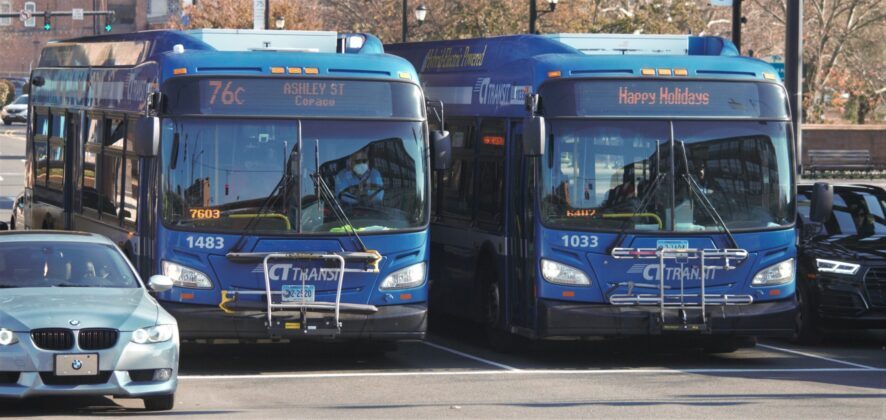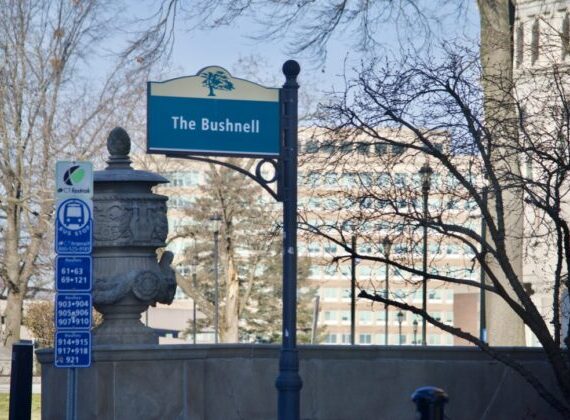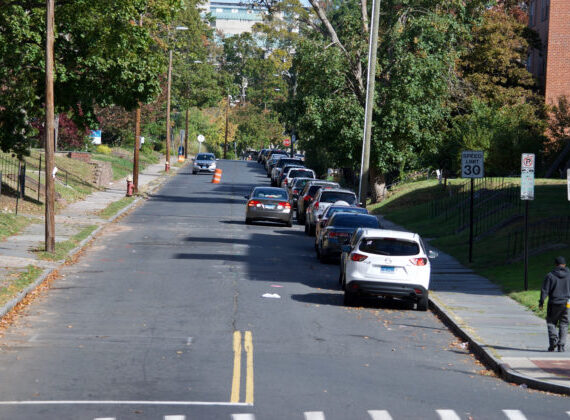One morning during rush hour I walked by a line of cars on Hartford’s Asylum Avenue and began counting. It was well into double digits before I came upon anyone who was carpooling. Every single-occupancy vehicle was the result of a series of poor choices, and each was a contribution to the traffic jam that they were stuck inside.
Who wasn’t making this situation worse? Every person whose decisions led them to instead ride a bus.
By 2030, greenhouse gas emissions in Connecticut should be reduced 45% below 2001 levels, as required by the Global Warming Solutions Act. Your neighbors opting to use public transportation are doing their share to reduce their carbon footprint and use fewer natural resources.
The best way to show your gratitude? Keep Connecticut’s buses fare free forever.
Do it for selfish reasons.
People board buses faster when they can simply walk or roll on, rather than having to pay at the front of the vehicle. Even for those not depositing nickels into the slot, fare box tech glitches make for delays in reading both swipe cards and phone apps. While passengers are sorting out fare, bus drivers either make the safe choice and hold up traffic, or they begin moving, distracted, while the person is still counting out change, imperiling the safety of the standing rider and others.
Keeping the bus free means removing both a hassle and an obstacle. Your cashier, waiter, nail technician, professor, museum professional, lawyer, and church outreach director could all do without having to scrounge up quarters or make sure their fare card is filled before heading out the door to work and beyond. Everyone has enough on their minds as it is, between figuring out the bus schedule to how best to combine errands.
Public transportation is regarded primarily as a way to deliver people to and from work, and that alone should be motivation to make it as seamless as possible as we all participate in and benefit from a functioning economic system, but it’s worth a reminder that people use the bus for all types of reasons, just as motorists use their cars, typically, for more than accessing employment. Want people to vote every November? Participate in town halls? Donate blood? Make it easy for them. This may not be an attractive option for candidates who want to specially arrange rides to the polls, thus ensuring votes, but it is more efficient for everyone when the bus is free and reliable.
Want to see your friends at potlucks? Young people in synagogue services? Neighbors helping with park cleanups? Elders singing in church choirs? Would you like more joy in your community? Make it easier for people to move from place-to-place.
There are those pushing out a false dichotomy, that we can have either expanded service or free buses. While they are correct that their thinking reflects the tired status quo, it is time to break out of that constrictive construct. We can and should imagine more for ourselves.
When you begin to think in terms of possibility, rather than scarcity, you can see how to fund the radical notion that everyone deserves the ability to participate in society, regardless of income or ability to operate a motor vehicle.
By suspending the gas tax, Connecticut loses out on $30 million in revenue each month. To keep buses fare free for the entire year, it costs $40 million. Gov. Lamont, in his campaign ads, boasted of the state’s $4B surplus. The money to extend fare free buses and expand public transportation service is there, if we want it. Don’t think the gas tax will completely cover it? Close the gap by immediately ceasing with any highway expansion.
That additional subsidies (suspending the gas tax) for private vehicles are a given while doing the same for those with less income requires debate speaks volumes about whose lives we center in this state. . . but this outmoded mindset is changing. It has to.
To do your part in thanking a bus rider for causing less damage to our habitat, contact your legislators to show support for keeping Connecticut buses fare free forever.



Richard
I am going to say a big thank you to all of those who ride the bus, myself and my partner Tim included. We have been riding the bus for the 43 years we have lived in this area. I can’t remember when the last time I was in a car. I wonder what will it take to get people to stop their one to a car driving? At the very least those of us who do not drive a car are putting a small weight on the other side of those who murder the planet earth. While we are on that subject, I will say as an art worker, a queer, in opposition to war, and the destroyers of the earth, I stand fully with the climate activists who are gluing themselves to works of art and throwing/dumping on the paintings. I really liked the flour all over the Andy Warhol BMW M1 car. “Our society is obsessed with objects, but it is not interested in protecting the future of its children.” (Last Generation) I can fully say that our planet earth is far more sacred than any work of art which many times is brought to us by the wealthy who are part and parcel in the destruction of the earth. I am sure the liberal elite class are clutching their pearls over these actions as the only thing they really fear is nuclear war.